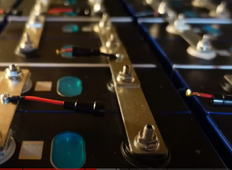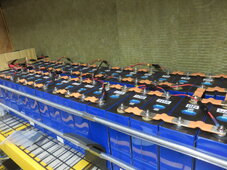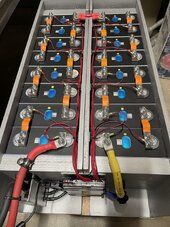OffGridForGood
Catch, make or grow everything you can.
I have been building DIY 8s and 16s packs for awhile now.
During the build on my first pack, I wondered about installing small inline fuses on the balance leads between the wire and the bus-bar connections. We always say "fuses protect wires" and we pick suitable fuses based on wire sizes.
That all said: What is protecting the BMS balance lead wires? And, more importantly what is protecting cells if the BMS were to fail?
This seemed a moot point when I started on DIY packs, however we are seeing higher active balance currents associated with BMS's and occationally I see some concerns raised about the potential for a BMS to fail and consequences to the cells if the failure is closed, instead of open.
This leads me to consider adding small fuses on each balance lead in my DIY packs.
Questions:
1. Is this an over-abundance of caution?
2. Do any of the commercially built packs use fuses on the balance leads?
3. If I did add a fuse to each balance lead, would I use a small 5-volt, 3Amp fuse? (depending on active balance current, times how much?)
4. What potential down-falls could result if a balance fuse fails during normal opertion of the BMS and pack?
5. If a balance lead fuse fails, how will the BMS respond, does this shut down the BMS? - how would we know the fuse has blown inside the pack case? (cell lead resistance is shown on the JK BMS's data, so an open would show here if one were to look for it.)
{I pondered if this discussion should be posted in DIY batteries, or Safety Check, - fundamentally I feel this is a question of safety, and thus posted here.}
During the build on my first pack, I wondered about installing small inline fuses on the balance leads between the wire and the bus-bar connections. We always say "fuses protect wires" and we pick suitable fuses based on wire sizes.
That all said: What is protecting the BMS balance lead wires? And, more importantly what is protecting cells if the BMS were to fail?
This seemed a moot point when I started on DIY packs, however we are seeing higher active balance currents associated with BMS's and occationally I see some concerns raised about the potential for a BMS to fail and consequences to the cells if the failure is closed, instead of open.
This leads me to consider adding small fuses on each balance lead in my DIY packs.
Questions:
1. Is this an over-abundance of caution?
2. Do any of the commercially built packs use fuses on the balance leads?
3. If I did add a fuse to each balance lead, would I use a small 5-volt, 3Amp fuse? (depending on active balance current, times how much?)
4. What potential down-falls could result if a balance fuse fails during normal opertion of the BMS and pack?
5. If a balance lead fuse fails, how will the BMS respond, does this shut down the BMS? - how would we know the fuse has blown inside the pack case? (cell lead resistance is shown on the JK BMS's data, so an open would show here if one were to look for it.)
{I pondered if this discussion should be posted in DIY batteries, or Safety Check, - fundamentally I feel this is a question of safety, and thus posted here.}






